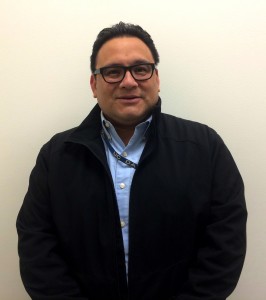by Melissa I. Cardenas-Dow
While Roberto C. Delgadillo has only been a member of APALA since December 2012, he has been a significant friend to many APALA members and a stalwart ally of our organization, before and since this time. Roberto joined APALA after the 2nd Joint Conference of Librarians of Color (JCLC), held in Kansas City, Missouri in September 2012. He was inspired to join our ranks because
I came away very impressed at the work of a number of high energy, committed and solid APALA members that really walked the line and addressed issues faced by all POC in the library profession.
Roberto says that he has yet to become more involved in APALA’s work, but he has already made some astounding contributions to the librarian profession and ALA. The latest was his participation as a panelist for the 2014 APALA President’s program “Immigration Reform, Asian Americans, and Librarianship” during ALA Annual in Las Vegas, NV.
Roberto shares his cultural heritage and background:
 I am Nicaraguan by birth and traveled with my family to the United States in the spring of 1975. We came to Los Angeles to take advantage of an offer by Shriners International and Shriners Hospitals for Children to have corrective surgical operations performed on my left leg and right knee as a result of a bout of childhood polio. That disease and a number of others broke out following the earthquake that occurred at 12:29 a.m. on Saturday, December 23, 1972 near Managua, the capital of Nicaragua. Needless to say, it was not the Christmas many Nicas expected!
I am Nicaraguan by birth and traveled with my family to the United States in the spring of 1975. We came to Los Angeles to take advantage of an offer by Shriners International and Shriners Hospitals for Children to have corrective surgical operations performed on my left leg and right knee as a result of a bout of childhood polio. That disease and a number of others broke out following the earthquake that occurred at 12:29 a.m. on Saturday, December 23, 1972 near Managua, the capital of Nicaragua. Needless to say, it was not the Christmas many Nicas expected!
By the time the aforementioned operations were completed in 1978, my family knew we would not return and so remained undocumented for a decade until our citizenship status could be resolved. Unlike many Nicaraguans at that time, we were raised as Baptists and not Catholic. I mention this because I recall many instances where others assumed otherwise or, because of the variety of Spanish I was raised with, thought we were of Mexican origin. More than once I had to remind to some, jokingly, that Nicas do not celebrate Cinco de Mayo and had we been there more than likely fought alongside the French during the Battle of Puebla.
As a Research Support Services Librarian at University of California, Davis, Roberto is the subject liaison to many disciplines and research areas: Chicana/o Studies, Disability Studies, Latin American Studies, Literatures in English, Military Science, Physical Education, Religious Studies, and Spanish and Portuguese Languages and Literatures.
Roberto mentions that one of his main goals in his professional work is outreach so that students, especially those from historically underrepresented backgrounds, understand the role of the library in their research and education. He actively tries to remind these students that “they have services they pay for all too often go unused or that others before them paid for in unmeasurable and unacknowledged ways.”
In addition to his commitment to outreach to students, Roberto also finds enjoyment and fulfillment in being a mentor to other librarians, saying,
My mentorship activities attune me to the ever changing landscape of librarianship and the need to serve and be there for others when they leave the confines of the university or consider career choices. I’ve been fortunate in my career to have had a number of mentors that freely gave me their patient counsel, support and kindness in the choices I’ve made. In turn, I feel the need to share and or empathize with others what I have learned not only as a librarian, but as an immigrant to this country, as a disabled person, and finally as the first in my family to earn a Master’s and subsequently a doctorate degree. I feel energized whenever I find someone willing to listen to what I have to say or, conversely, when they seek me out! I don’t want, in my career, to be known as what I refer to as a “Lord Poopington”: one who never goes beyond the library desk or is willing to share what life lessons informed them.
Perhaps Roberto’s proactive attitude is led by his desire to live by the last stanzas of Mary Oliver’s poem “When Death Comes”:
When it’s over, I want to say: all my life
I was a bride married to amazement.
I was the bridegroom, taking the world into my arms.
When it is over, I don’t want to wonder
if I have made of my life something particular, and real.
I don’t want to find myself sighing and frightened,
or full of argument.
I don’t want to end up simply having visited this world.
Interview conducted by Melissa I. Cardenas-Dow. Editing and writing support provided by Alyssa Jocson Porter.

